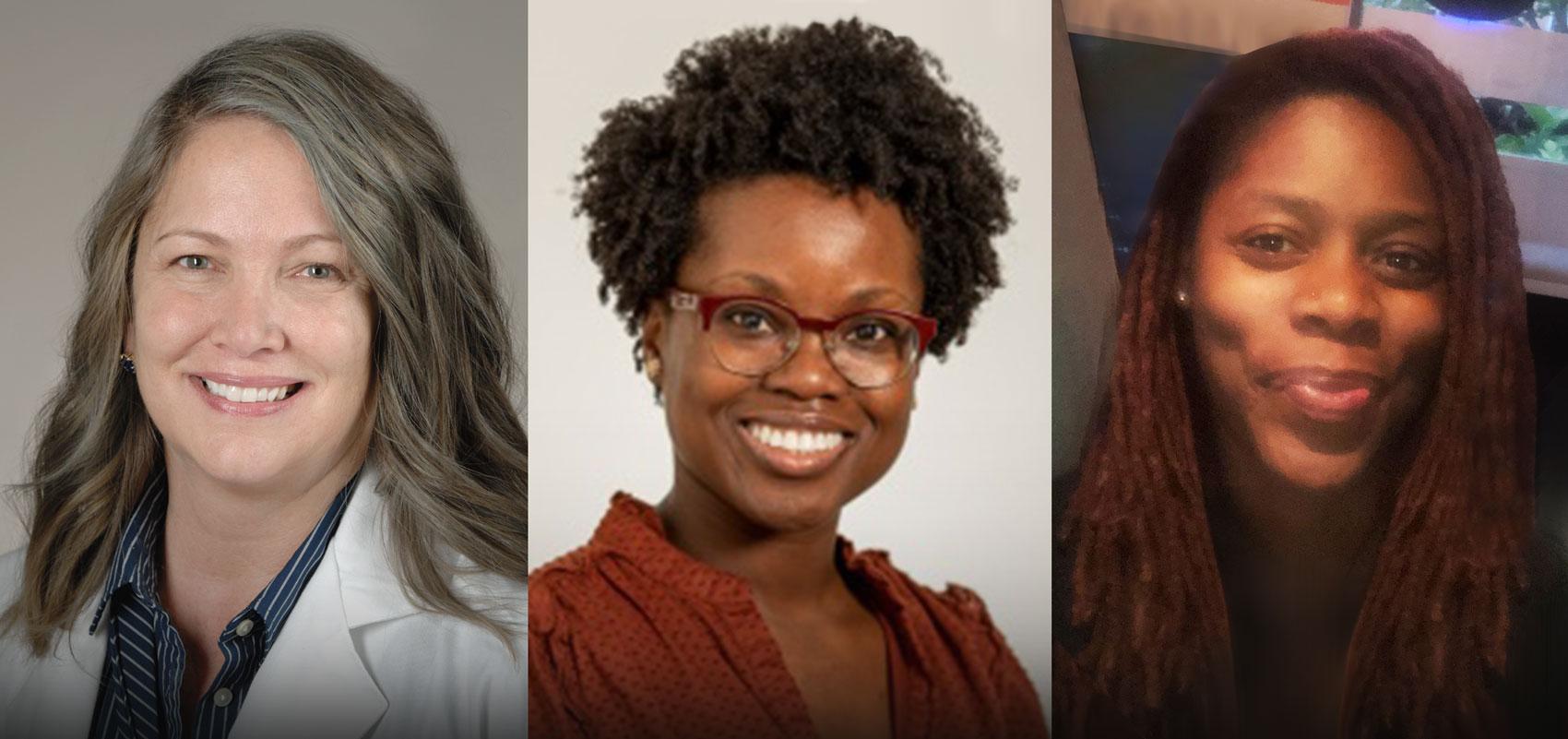Dr. Terri Armstrong, Alvina Acquaye-Mallory, and Tracy Ani were recognized for their efforts to make clinical trials more inclusive, while Dr. Jing Wu was recognized for her research on the anticancer drug zotiraciclib.
By Raleigh McElvery, Scientific Communications Editor
April 5, 2023
Each year, the National Cancer Institute (NCI) comes together for the NCI Director’s Awards Ceremony to celebrate staff members’ administrative and scientific accomplishments. This year’s awards ceremony was held both virtually and in person on March 29, honoring over 700 award recipients—including four from the NCI Center for Cancer Research (CCR) Neuro-Oncology Branch (NOB).
“One of the most important ways NCI contributes to cancer research is to bring together people with the brightest minds and the biggest hearts,” NCI Director Monica Bertagnolli, M.D., said in a pre-recorded video message to the awardees. She congratulated them on their achievements and thanked them for their service and sacrifices in a time that’s “still very complicated by the pandemic and all of the challenges that have come with it.”
NCI Director’s Champion Award: Clinical Trials Diversity, Equity, and Inclusion Committee, Including NOB Members Dr. Terri Armstrong, Alvina Acquaye-Mallory, and Tracy Ani
CCR’s Clinical Trials Diversity, Equity, and Inclusion (CTDEI) Committee was awarded an NCI Director’s Champion Award for their exceptional work addressing barriers to the inclusion of underrepresented patient populations in CCR clinical trials. Formed in 2021 and chaired by NOB Deputy Chief Terri Armstrong, Ph.D., the CTDEI Committee was charged with identifying barriers and developing solutions related to trial outreach, referrals, screening, enrollment, and continuity of care for each individual patient. Their vision is to foster a welcoming and inclusive environment for all patients, caregivers, and healthcare providers.
According to Dr. Armstrong, the CCR clinical research program is unique because it utilizes cutting edge approaches and services patients with rare diseases. “All patients who are being seen are also enrolled in clinical studies, and care is provided at no cost,” she said. “At the same time, the treatments are often early phase trials. They may require frequent assessments and be associated with unique barriers. As a result, ensuring equity in engagement and access—in addition to training staff to communicate with and care for diverse populations—is essential.”
The committee is currently composed of 18 individuals, including members of CCR who are involved in clinical care and administration, as well as a community advocate. In addition to Dr. Armstrong, the committee also contains two other NOB staff members: Alvina Acquaye-Mallory and Tracy Ani.
Acquaye-Mallory, NOB Patient Outcomes Program manager, co-leads one of the committee’s working groups. Her group develops ways to engage underrepresented patients, their providers, and referring physicians to determine how to improve the overall experience.
“Understanding how comfortable patients feel and their interactions with providers can help us see what is working and what isn’t,” Acquaye-Mallory said. “It is essential that underrepresented patients are treated fairly and get the same opportunities to participate in clinical trials, so they don’t feel isolated and can make informed decisions about their care.”
Ani works at the NOB as a patient care coordinator. She’s typically one of the first people to communicate with outside providers and new patients, and brings this unique perspective to her work with the CTDEI Committee.
“The committee’s goal is to improve access, equity, and inclusion in clinical trials at the NIH,” Ani said. “I hope to improve transparency in clinical trial objectives and outreach, starting with local communities and physicians.”
The CTDEI Committee’s accomplishments thus far include implementing travel assistance for a patient’s first consultation; broadening CCR clinical trial eligibility; forging partnerships with outside referring groups; developing data visualization platforms; and hiring a healthcare diversity research expert to lead community- and clinical-based programs.
NCI Director’s Scientific Award: Dr. Jing Wu
Jing Wu, M.D., Ph.D., head of the NOB’s Translational Research Program, earned an NCI Director’s Scientific Award in honor of her preclinical and clinical research on the anticancer drug zotiraciclib.
Dr. Wu’s team has been working hard to develop zotiraciclib therapies targeting gliomas—tumors in the brain or spine that are highly resistant to treatment. Several years ago, the researchers performed extensive preclinical studies to investigate zotiraciclib both as a single agent and in combination with temozolomide (a common chemotherapy). They then launched a successful phase 1/2 clinical trial in adult patients, which they completed in 2020. Most recently, Dr. Wu’s team initiated a new phase 1/2 study examining zotiraciclib in adults with gliomas containing specific genetic mutations.
“This is exactly how I like to conduct my translational research: design and perform laboratory studies based on clinical questions, then take interesting findings from the laboratory bench and apply them to a clinical trial,” Dr. Wu said. “Then you bring your clinical observations back to the bench—and eventually back to the clinic to improve patients’ clinical outcomes.”
Thanks to Dr. Wu’s work, several years ago the U.S. Food and Drug Administration granted orphan drug status to zotiraciclib for use in patients with gliomas. Orphan drug designations are reserved for promising treatments that address rare diseases affecting fewer than 200,000 people in the United States.
“I have a group of wonderful, highly motivated scientists and a clinical team working with me,” Dr. Wu said. “I couldn’t have conducted this research or earned this NCI Director’s Award without them.”
“This is a truly remarkable group of awardees,” Tom Misteli, Ph.D., director of CCR, added in his video message to the awardees. “It's a very diverse group in what they do and who they are. And that kind of diversity is precisely what it takes for us to be successful in CCR.”

